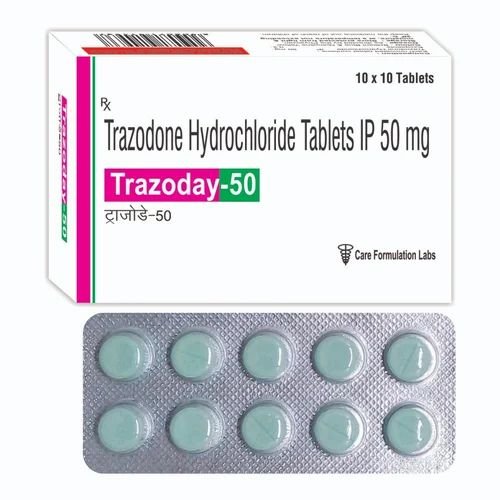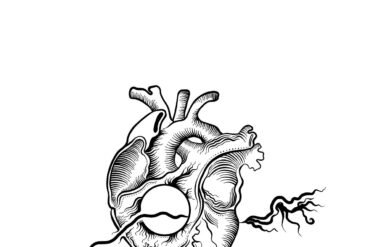Trazodone (Desyrel) for Depression and Insomnia

Table of Contents
- What is Trazodone?
- How Does Trazodone Work?
- Trazodone for Depression: Effectiveness and Side Effects
- Trazodone for Insomnia: Effectiveness and Side Effects
- Important Considerations and Precautions
What is Trazodone?
Trazodone, commonly sold under the brand name Desyrel, is a medication primarily used to treat depression and insomnia. It belongs to a class of drugs known as serotonin antagonist and reuptake inhibitors (SARIs) and works by balancing the levels of certain chemicals in the brain, including serotonin.
Trazodone is classified as an antidepressant and is typically prescribed for major depressive disorder. However, it is also commonly prescribed off-label to treat insomnia, anxiety disorders, and even chronic pain.
When used for depression, trazodone helps to alleviate symptoms such as low mood, loss of interest, changes in appetite and sleep patterns, and feelings of worthlessness. For insomnia, it helps to promote a restful sleep by decreasing the time it takes to fall asleep and reducing the number of awakenings during the night.
Trazodone is available in tablet form and is usually taken orally, with or without food. The dosage and duration of treatment vary depending on the individual’s condition and response to the medication. It is important to follow the instructions provided by the healthcare professional and not to adjust the dosage or stop the medication abruptly without medical guidance.
As with any medication, trazodone may cause side effects. Common side effects include drowsiness, dizziness, dry mouth, headache, blurred vision, and constipation. These side effects are typically mild and temporary, but if they persist or worsen, it is important to inform the prescribing physician.
While trazodone is generally well-tolerated, it can interact with certain medications, such as monoamine oxidase inhibitors (MAOIs), and increase the risk of serotonin syndrome. Therefore, it is crucial to inform the doctor about all the medications and supplements being taken before starting trazodone.
In conclusion, trazodone is a medication commonly prescribed for the treatment of depression and insomnia. It helps to balance brain chemicals and alleviate symptoms associated with these conditions. However, it is important to use trazodone as directed by a healthcare professional and to be aware of potential side effects and drug interactions.
- Trazodone is primarily used to treat depression and insomnia.
- It belongs to the class of drugs known as serotonin antagonist and reuptake inhibitors (SARIs).
- It helps to balance brain chemicals, including serotonin.
- Trazodone is available in tablet form and is taken orally.
- Common side effects include drowsiness, dry mouth, and headache.
- Trazodone may interact with certain medications, so it is important to inform the doctor about all other medications being taken.
How Does Trazodone Work?
Trazodone, commonly known by its brand name Desyrel, is a medication primarily used for the treatment of depression and insomnia. It belongs to a class of drugs called serotonin receptor antagonists and reuptake inhibitors (SARIs), which work by affecting chemical messengers in the brain known as neurotransmitters.
Specifically, trazodone works by increasing the levels of serotonin in the brain. Serotonin is a neurotransmitter that plays a key role in regulating mood, sleep, and other important functions. Low levels of serotonin have been associated with depression, anxiety, and sleep disturbances.
By inhibiting the reuptake of serotonin and blocking certain serotonin receptors in the brain, trazodone helps to increase available serotonin levels. This, in turn, helps to improve mood, reduce depressive symptoms, and promote a sense of calmness and relaxation.
Trazodone is also commonly prescribed off-label for the treatment of insomnia. Its sedating properties make it effective in promoting sleep, especially among individuals who have difficulty falling asleep or experience disruptions throughout the night.
When used for depression, trazodone is typically taken in doses ranging from 150 to 300 milligrams per day, divided into several smaller doses. However, for insomnia, lower doses are often prescribed, usually around 50 to 100 milligrams taken before bedtime.
It’s important to note that trazodone’s effectiveness can vary from person to person, and it may take several weeks to experience its full therapeutic benefits. It is generally well-tolerated, but like any medication, it can cause side effects such as dizziness, drowsiness, dry mouth, and constipation.
Additionally, trazodone should be used with caution in individuals with certain medical conditions or those taking certain medications, so it’s essential to discuss your medical history and any other medications you are taking with your healthcare provider.
- Trazodone increases serotonin levels in the brain.
- It is primarily used for treating depression and insomnia.
- Higher doses are used for depression, while lower doses are used for insomnia.
- Results may vary, and it may take several weeks to experience full benefits.
- Possible side effects include dizziness, drowsiness, dry mouth, and constipation.
- Caution should be exercised when using trazodone with certain medical conditions or medications.
Ultimately, trazodone can be an effective treatment option for depression and insomnia when used under the guidance of a healthcare professional. It is important to follow the prescribed dosage and regularly communicate with your doctor to monitor its effectiveness and any potential side effects.
Trazodone (Desyrel) is a medication commonly prescribed for the treatment of depression and insomnia. It belongs to a class of drugs called serotonin modulators, which work by increasing the levels of serotonin, a neurotransmitter, in the brain. As with any medication, it is important to understand the effectiveness and potential side effects of Trazodone before starting treatment.
**Effectiveness**
Trazodone has shown effectiveness in relieving symptoms of depression in many individuals. It is primarily used for depression that is accompanied by insomnia, as it has sedating properties that can aid in improving sleep quality. Unlike some other antidepressant medications, Trazodone is less likely to cause sexual side effects, making it a preferred choice for individuals who experience such issues with other medications.
Trazodone is often prescribed as an adjunct treatment for depression alongside other antidepressants. It can help improve mood and reduce anxiety, which can be particularly beneficial in cases where insomnia is a significant problem. However, it should be noted that Trazodone is not a first-line treatment for depression but rather a secondary option or a complementary medication.
**Side Effects**
As with any medication, Trazodone may cause side effects in some individuals. Common side effects include drowsiness, dizziness, dry mouth, blurred vision, and constipation. These side effects are generally mild and may go away with continued use of the medication. However, if they persist or worsen, it is important to consult a healthcare professional.
In rare cases, Trazodone may cause more serious side effects, such as a dangerously low blood pressure, priapism (prolonged and painful erection), or serotonin syndrome (a potentially life-threatening condition caused by excessive serotonin levels). It is crucial to seek immediate medical attention if any of these symptoms occur.
**Important Considerations**
Before starting Trazodone, it is essential to inform your healthcare provider about any pre-existing medical conditions, allergies, or medications you are currently taking. This will help the doctor determine if Trazodone is suitable for you and if any dosage adjustments or precautions are necessary.
It is also important to note that Trazodone may interact with certain medications, including MAO inhibitors, selective serotonin reuptake inhibitors (SSRIs), and tricyclic antidepressants. These interactions can lead to potentially harmful effects, so it is crucial to inform your healthcare provider about all the medications you are currently taking.
In conclusion, Trazodone can be an effective medication for the treatment of depression, particularly when accompanied by sleep disturbances. It provides sedating properties to aid in improving sleep quality, with a lower likelihood of causing sexual side effects compared to some other antidepressants. However, it is important to be aware of potential side effects and to consult a healthcare professional before starting or adjusting the dosage of this medication.
Trazodone for Insomnia: Effectiveness and Side Effects
Trazodone, also known by its brand name Desyrel, is a commonly prescribed medication for both depression and insomnia. While it primarily functions as an antidepressant, its sedating effects have made it a popular choice for individuals struggling with sleep disorders.
Effectiveness:
- Trazodone is often prescribed off-label for insomnia, particularly for people who have difficulty falling asleep or staying asleep throughout the night.
- Studies have shown that trazodone can decrease the time it takes to fall asleep and improve overall sleep quality.
- It is especially effective in cases where insomnia is accompanied by symptoms of depression or anxiety.
- However, trazodone may be less effective for individuals with chronic insomnia or those who experience frequent awakenings during the night.
Side Effects:
- Like any medication, trazodone can cause certain side effects. The most common ones include drowsiness, dizziness, and lightheadedness.
- Other side effects may include dry mouth, blurred vision, constipation, and headache.
- In rare cases, trazodone can also lead to more serious side effects such as priapism (painful, prolonged erection) or serotonin syndrome.
- Serotonin syndrome is a potentially life-threatening condition that occurs when there is an excess of serotonin in the brain. It can cause symptoms like confusion, rapid heart rate, and high blood pressure.
If you are considering trazodone for insomnia, it is essential to consult with a healthcare professional who can assess your individual needs and provide appropriate guidance. They can evaluate potential benefits against possible side effects and recommend appropriate dosage.
It’s important to note that trazodone should not be used without a prescription or taken with other medications without the guidance of a healthcare professional. Combining trazodone with certain drugs or alcohol can amplify its sedative effects and increase the risk of adverse reactions.
In conclusion, trazodone can be an effective option for individuals struggling with both depression and insomnia. However, its efficacy may vary depending on individual circumstances, and it is crucial to weigh the potential benefits against the possible side effects. Always consult with a healthcare professional before starting any new medication or making changes to your treatment plan.
Important Considerations and Precautions
When considering the use of Trazodone (Desyrel) for depression and insomnia, there are several important aspects and precautions that should be taken into account. Trazodone is primarily prescribed as an antidepressant, but it is also commonly used off-label for sleep disorders such as insomnia. However, before starting this medication, it is crucial to be aware of the following points:
- Trazodone should only be used under the guidance and supervision of a qualified healthcare professional.
- Prior to starting Trazodone, a thorough medical evaluation should be conducted to assess the individual’s overall health condition and any potential contraindications.
- Inform your healthcare provider about any history of allergic reactions to medications or any other relevant allergies to avoid potential adverse reactions.
- Trazodone may interact with other medications, including over-the-counter drugs, herbal supplements, and certain foods. Always disclose all the medications and supplements you are taking to avoid potential drug interactions.
- Individuals with a history of heart disease, liver or kidney problems, or epilepsy should exercise caution before starting Trazodone, as it may affect these conditions.
- It is essential to follow the prescribed dose and recommended dosing schedule strictly. Do not alter the dosage or stop taking Trazodone abruptly without consulting your healthcare provider, as this can lead to withdrawal symptoms.
- Antidepressants like Trazodone can increase the risk of suicidal thoughts and behaviors, especially in individuals under the age of 25. Close monitoring and regular communication with a healthcare professional are crucial during treatment.
- Some common side effects of Trazodone include drowsiness, dizziness, dry mouth, blurred vision, and constipation. If any significant side effects occur or persist, inform your healthcare provider promptly.
- Avoid consuming alcohol while taking Trazodone, as it can intensify side effects and impair judgment and coordination.
It is important to note that each individual’s response to Trazodone may vary, and the medication’s effectiveness and safety should be regularly assessed by a healthcare professional. Always seek medical advice before initiating or modifying any treatment plan involving Trazodone or other medications for depression and insomnia.


























